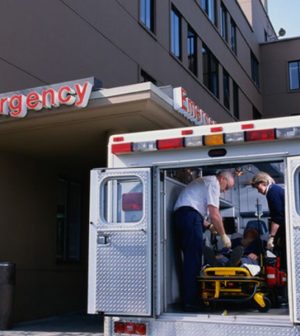- Could Your Grocery Store Meat Be Causing Recurring UTIs?
- Are You Making This Expensive Thermostat Error This Winter?
- Recognizing the Signs of Hypothyroidism
- 10 Strategies to Overcome Insomnia
- Could Artificial Sweeteners Be Aging the Brain Faster?
- Techniques for Soothing Your Nervous System
- Does the Water in Your House Smell Funny? Here’s Why
- Can a Daily Dose of Apple Cider Vinegar Actually Aid Weight Loss?
- 6 Health Beverages That Can Actually Spike Your Blood Sugar
- Treatment Options for Social Anxiety Disorder
Be Prepared to Take FAST Action If You Suspect a Stroke

Would you be able to recognize if you or someone close to you were having a stroke? A stroke is a 911 medical emergency and every second counts for survival.
To help you recognize the signs of stroke, the National Stroke Association wants you to remember F-A-S-T, or fast.
F stands for “face.” Signs of stroke include drooping or numbness on just one side of the face. An uneven smile is another clue that something’s wrong.
A stands for “arm.” Is just one arm weak or numb? If the person tries to lift both arms, does one drift downward? In general, stroke signs appear on just one side of the body.
S stands for “speech.” When a stroke happens, the person can’t speak or their speech is slurred or hard to understand. He or she won’t be able to accurately repeat a simple sentence.
T stands for “time.” It’s time to call 911 if you see any of these symptoms. Even if the symptoms go away, the person needs to get to the hospital fast. There’s a finite window of opportunity for care, particularly the administration of a specialized clot-busting medication, needed when the stroke is due to a blood clot.
More Signs of Stroke
- Sudden numbness or weakness in one leg.
- Sudden confusion.
- Trouble understanding, seeing or walking.
- Dizziness or lack of balance.
- A sudden severe headache with no known cause.
It’s good to know the name and location of the stroke center nearest to you. Leading hospitals and medical centers with comprehensive stroke services often carry the designation “Certificate of Distinction” from the Joint Commission, an accreditation organization. You can access a stroke center database at qualitycheck.org.
To protect yourself and loved ones, learn all you can about stroke now, so you’ll be prepared should an emergency strike.
More information
The National Stroke Association has more facts about stroke.
Source: HealthDay
Copyright © 2026 HealthDay. All rights reserved.










